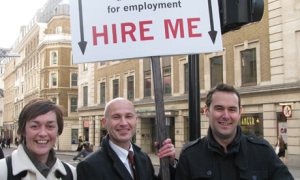 One young man who deserves kudos for his initiative and chutzpah in job hunting methods is Tom Gockelen-Kozlowski (photo: Guardian).
One young man who deserves kudos for his initiative and chutzpah in job hunting methods is Tom Gockelen-Kozlowski (photo: Guardian).
“Tom who?”
Exactly. Because no one knew who he was, this 22-year-old graduate put a suit on, stuffed his pockets with business cards and decided to spend over a week doorstepping every single national newspaper in hopes of being offered a job.
Tom: “knock knock”
Tom does not have NCTJ qualifications and, instead of starting his job hunt among local and regional newspapers, he took the reverse route and knocked straight on the doors of the nationals.
Reckless? Naive? Plain stupid? Maybe. His actions certainly defied the traditional career path for journalists.
The problem is people tend to dislike nonconformists. His account in The Guardian provoked criticism and contempt in several readers one of whom even posted a blog especially to express how “jaw-droppingly arrogant” he thought Tom was and how he would never get a job in journalism that way.
But was it really arrogance that motivated him? Or was it his dare-to-dream attitude that made us feel uncomfortable because some of us have lost the capacity for it ?
Surely Tom was aware of the chances of having doors slammed in his face. Yet he had to try his luck, the alternative being to stay at home and agonise whether he’d have been successful had he done what he did. Can you blame him for that?
And the results? Well, he’s still unemployed.
Tom G-K may not have got himself a job as an immediate outcome of his stunt, but the experience certainly boosted his confidence, made him talked about in media circles and got people reading his blog. He is already a huge step ahead of others who haven’t dared. And aren’t those positive qualities to look for in a budding journalist’s CV?
Paxman says so
In fact, at the ‘Is Journalism in Crisis’ conference at Coventry University in October, Jeremy Paxman advised graduates to do exactly that: “go knock on doors” As reported here on Journalism.co.uk, the veteran journalist said:
“I’m always being approached by people who want to get into this business and I always try and put them off. I do so in the certain knowledge that if they are put off from the job they shouldn’t be doing it.”
Gary: “hire me”
 It is not only the relatively inexperienced and young who have been taking unusual avenues into job hunting.
It is not only the relatively inexperienced and young who have been taking unusual avenues into job hunting.
Gary Sullivan (photo: Guardian), a 51-year-old veteran design and print professional, who was made redundant, took to the streets with a billboard that read “Hire me” and flyers with his CV and website address printed, as reported by The Guardian.
Gary says he could have easily got a job two years ago, but now he would be lucky if he even got an interview:
“At first I went down all the usual routes, sending letters and applying for jobs online but I wasn’t getting anywhere and I got to the stage where I thought I have to do something else. “
A creative thinker in a creative industry. Lucky will be the employer who offers him a job.
Thinking laterally
According to the Office for the National Statistics (ONS):
- At the end of September 2009, there were 2.46 million people out of work in the UK, a 0.1 percentage point increase on the previous quarter’s rate to 7.8%.
- The number of existing vacancies between August and October was 428,000, the lowest figures on record.
Unemployment has become a such a high hurdle to overcome, jobseekers are resorting to unusual methods to get themselves noticed ahead of the competition.
Those who denounce them as being arrogant, over-confident or attention-seeking, will most likely be the lucky few with stable jobs and guaranteed paycheques at the end of the month.
The current recession is like no other, an indomitable wild beast. Desperate times require courage and perseverance but they also call for the ability to be resourceful, inventive and, above all, positive.
Tom Gockelen-Kozlowski and Gary Sullivan’s stories prove, if anything, that a good sense of humour can go a long way in keeping jobseekers laughing at themselves.
Loving the word no
John Kehoe, author of Mind Power into the 21st century, says we must learn to love the word “no”. Every time we hear a no, we are one step closer to a yes, he says.
“The more “no’s” you hear, the more “yes’s” are bound to happen. Love the word ‘no’; it’s the sound of success in motion. When you’re not hearing it, you’re in deep trouble.”
Could there be more encouraging words than those for desperate jobseekers?
Now excuse us while we go chase our dreams.
Related Links:
- There’s nothing wrong with aiming high – a blog inspired by Tom by @rosieniven: http://rosieniven.wordpress.com/2009/12/01/theres-nothing-wrong-with-aiming-high/#more-298
- How to become a journalist by Guardian travel writer Benji Lanyado, whom Tom impressed: http://benjilanyado.wordpress.com/2009/11/25/how-to-become-a-journalist-beta/
- Tom G-K’s blog: http://atleasti.wordpress.com/2009/10/
- Gary Sullivan’s website & CV: http://www.gary-sullivan.moonfruit.com/



 The truth is: on this crusade to claw back into the job market, you are a lone knight and your own imagination and resourcefulness are the only weapons that can save you from defeat by your own despair.
The truth is: on this crusade to claw back into the job market, you are a lone knight and your own imagination and resourcefulness are the only weapons that can save you from defeat by your own despair.